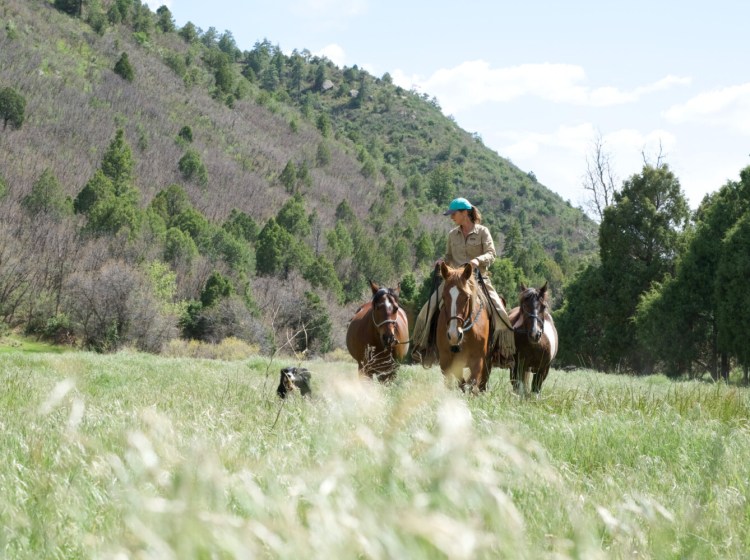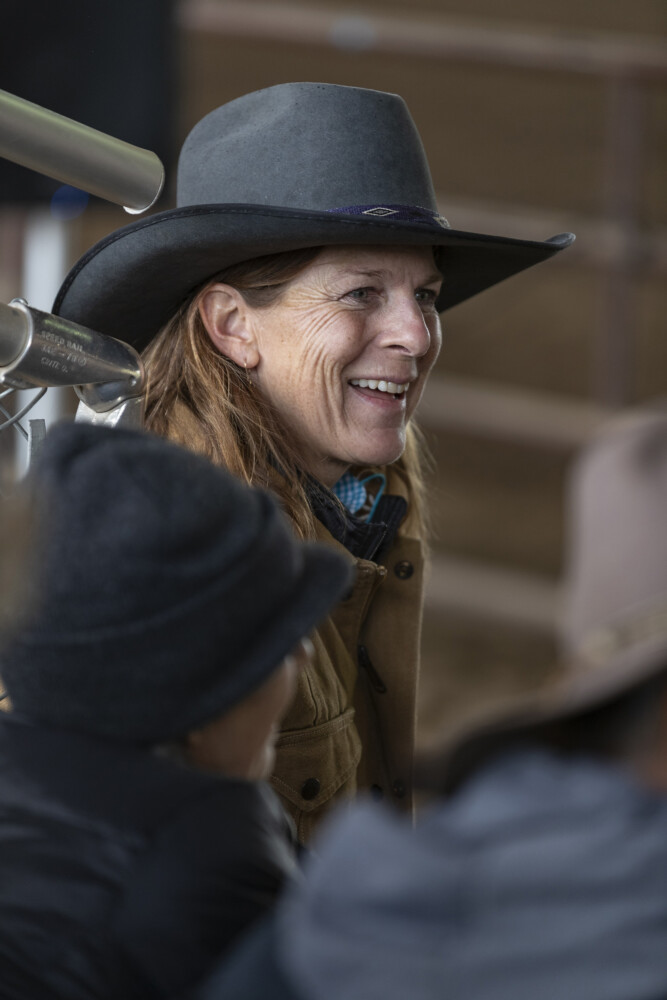As a girl growing up in Harpswell, Maddy Butcher took care of a neighbor’s horse – and found her life’s work. Today, Butcher has four horses of her own and teaches hundreds of equestrians how to better care for their horses at a conference she founded that is aimed at debunking many myths of horse husbandry.
The Best Horse Practices Summit is an annual two-day conference where leading scientists, horse trainers and veterinarians work as a team to teach a style of husbandry that differs from the conventional methods and, they say, is healthier for the animal. Its style of holistic horse care puts the animal’s needs first.
Butcher established the conference in 2017 in Colorado, where she now lives, and held it there in 2018 as well. Both conferences sold out. For the first time, it’s coming to her home state, specifically Pineland Farms in New Gloucester next weekend. About 200 horse owners attend each year; the conference is intentionally small, Butcher said.
“It does strike me as a unique format because it’s small and intimate, but also because of the high caliber of trainers. You don’t see the combination at horse expos,” said Santa Cruz horse trainer and author Jec Ballou, who lectures around the country on the benefits of horse physical therapy and will speak at this year’s summit.
“The clinicians Maddy gets at the Best Horse Practices Summit are people engaged in a lot of research or have some scientific background. I’m excited to be a part of it,” Ballou added. “I’m equally as excited to experience it.”
Butcher started riding at age 12 when a neighbor in Harpswell went to college and hired her to take care of the pony she left behind. Butcher was instantly smitten. For the next 10 years, she rode, fed, brushed and cleaned stalls for Honey on and off, even after going to college – she studied biology, concentrating on birds, at Brown University.
“I have great memories of (Honey and I) riding every day in the summer,” said Butcher, 55. “That was back when the former navy base in Brunswick had a gas line that ran 12 miles to the end of Harpswell Neck. There was this 100-yard swath of easement that could be used by walkers and dirt bikes, and horse riders. I feel really blessed I was there at that time.”

Maddy Butcher grew up riding in Harpswell. When she returned to Maine at age 40, she got her first horse. Photo courtesy of Maddy Butcher
When she was 40, she and her now ex-husband moved from Massachusetts to Maine to raise their three boys here. She then got her first horse – or horses, a quarter horse and a retired race horse. The family settled on 10 acres in Brunswick, where Butcher started a horse-care business.
That led to another start-up: an equestrian online newsletter called NickerNews, which sought to teach “the compassionate care of horses.” Three more horse-related websites followed, including Horse Head, which focuses on the chemistry of a horse’s brain.
Butcher advertised her websites at the Equine Affaire in Springfield, Massachusetts, one of the largest horse expositions in the country. But she was distressed to find teachings at the expo that contradicted her own understanding of horse care. She felt the expo was grounded in consumerism, and that bothered her. She watched vendors hawking commonly used horse products, such as blankets and grain, which she believes are bad for horses. Grain hurts a horse’s indigestion, she knew from her own research, and horses don’t need blankets to keep warm. She isn’t a fan of leaving horses in stalls for long periods, either.
“There is no research to support that a blanket is good for a horse. They have their own thermal regulation,” Butcher said. “If it’s cold, the answer is to give them more hay so they can burn more energy, not to put insulation on them so they can’t regulate themselves.”
She got the idea to create a smaller horse expo that would teach holistic horse care based on research, not common practices. From interviews she conducted for her websites with veterinarians, scientists and horse trainers, she had a wide circle of equestrian contacts. In 2016, she formed the nonprofit Best Horse Practices Summit and became its executive director. She launched the summit the following year in Durango. Its motto: “The horse conference your horse wants you to attend.” Its mission in part: “to improve the horse-human connection.” Presenters taught attendees how to read horse behavior and use data-based research to better understand a horse’s needs.
“Out West, more people take care of horses in a way that suits the horses,” Butcher said. “People turn horses out on several hundred acres and the horses take care of themselves. What I saw growing up in New England is that just because of the constraints of acreage or time, people have gotten away from what is ideally best for horses, whether it’s deliberate or not. It’s been a dream of mine to bring the summit to Maine.”

Butcher has four horses in Mancos, Colo., where she lets them graze freely rather than stalling them. Photo by Beau Gaughran
The summit has had an impressive roster of speakers, such as Gerd Heuschmann, an equine biomechanics specialist and a former veterinarian at the Olympics. Expertise like his, according to Ballou, “is impossible to find in the horse world today.”
Ballou herself has published several books, and at lectures around the U.S. teaches exercises that people can do with their horses to improve the animal’s range of motion. When the horse’s balance and alignment are corrected, Ballou said, the horse enjoys activity more and becomes a better teammate for the rider.
Two Maine equestrians who are on the summit’s board said they are delighted to have it in Maine. Debbie Hight of Norridgewock said she’s learned to take a “thoughtful, mindful” approach to riding from attending the summit.
Julie Kenney of Harpswell, another board member and a horse owner of 20 years, noted, “There are a lot of old-school ideas going around about handling horses that aren’t beneficial to the horse.” For instance, many people keep their horses in stalls for all but a few hours a day, she said, despite research that shows such confinement impairs horses’ mental and physical health and causes them to act up. She stopped stalling her horse at night: “They do quite well outside,” she said.
It’s for advocating such horse-first approaches, Kenney said, that makes her “passionate about the summit and what it teaches.”
Send questions/comments to the editors.





Success. Please wait for the page to reload. If the page does not reload within 5 seconds, please refresh the page.
Enter your email and password to access comments.
Hi, to comment on stories you must . This profile is in addition to your subscription and website login.
Already have a commenting profile? .
Invalid username/password.
Please check your email to confirm and complete your registration.
Only subscribers are eligible to post comments. Please subscribe or login first for digital access. Here’s why.
Use the form below to reset your password. When you've submitted your account email, we will send an email with a reset code.